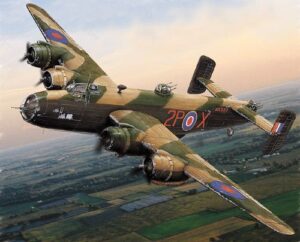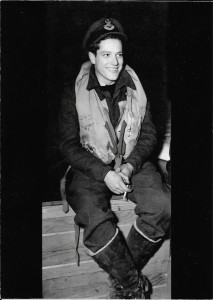November 11: I went to the RCAF memorial service in Mount Pleasant Cemetery this morning. Eighty years ago today, my Father was a Navigator in a Halifax bomber flying a radar training mission over southern England. He had arrived in England after months of training that began in June 1943. Based at Malton (now Pearson Airport), they flew more than 100 hours of day and night missions before being stationed at Bishop’s Court in Northern Ireland. In May, 1944, he began flying with his permanent crew in Worcestershire, and then later near York. By the end of training in September he had amassed 172 hours of daylight flying, and 125 hours of nighttime missions.
Active duty began October 1, 1944 with various practice drills before the first OP’s to Dortmund on October 5. After the relative safety of practice drills and training, it must have been terrifying for everyone to now be on active duty with someone trying diligently to kill you. He mentioned taking flak a couple of times, but I don’t believe that there was ever a really serious incident for him that one would call “life-threatening”. That is, of course, relative.
 Before November 11, he had flown 13 missions over Germany and that later continued with flights to Dusseldorf, Oberhausen and Castrop Rauxal (October 21). On this last mission, the plane lost an engine and the Pilot (F/O Sefton) knew that they were not going to make it back to base. The plane was over England, near Leeming, and crash landed in a farm field. Dad said that he and another crew were in the middle of the plane – between the wings being the strongest part of the frame – when they felt a fairly strong impact. Thinking they were on the ground, they relaxed a bit and waited for the plane to stop, but it continued for some time before there was a much stronger impact and the tail of the plane disappeared. Thinking of the fuel tanks and the possibility of an explosion, Dad and his mate took off out the back of the plane and across the field only to later realize that the first impact had been with two trees that had taken both wings – and the fuel tanks – off the plane. The bomb aimer was killed; (he essentially sat next to the Navigator position in the nose of the aircraft), the remainder of the crew had minor injuries.
Before November 11, he had flown 13 missions over Germany and that later continued with flights to Dusseldorf, Oberhausen and Castrop Rauxal (October 21). On this last mission, the plane lost an engine and the Pilot (F/O Sefton) knew that they were not going to make it back to base. The plane was over England, near Leeming, and crash landed in a farm field. Dad said that he and another crew were in the middle of the plane – between the wings being the strongest part of the frame – when they felt a fairly strong impact. Thinking they were on the ground, they relaxed a bit and waited for the plane to stop, but it continued for some time before there was a much stronger impact and the tail of the plane disappeared. Thinking of the fuel tanks and the possibility of an explosion, Dad and his mate took off out the back of the plane and across the field only to later realize that the first impact had been with two trees that had taken both wings – and the fuel tanks – off the plane. The bomb aimer was killed; (he essentially sat next to the Navigator position in the nose of the aircraft), the remainder of the crew had minor injuries.
 He also spoke of waiting in line to take off on a night mission. The first aircraft in line would be given a green light, signifying that it was clear to take off. When they had cleared the field, the next in line would be given the green and off you would go. On this particular night, one of the aircraft ahead of Dad’s plane had attempted takeoff and collided with trees near the end of the runway. There was a massive explosion (being fully fueled and loaded with bombs), and then a brief pause before the next plane was given the green light.
He also spoke of waiting in line to take off on a night mission. The first aircraft in line would be given a green light, signifying that it was clear to take off. When they had cleared the field, the next in line would be given the green and off you would go. On this particular night, one of the aircraft ahead of Dad’s plane had attempted takeoff and collided with trees near the end of the runway. There was a massive explosion (being fully fueled and loaded with bombs), and then a brief pause before the next plane was given the green light.
His time in the Halifax ended in March 1945 when he had flown 33 missions and more than 210 hours aloft. He never spoke much about his time overseas. By 1955, ten years later, he had studied to become a Chartered Accountant, had his first child (me), bought their first house and done some renovations, had their second child (my sister Nancy), started his own business and moved up to their second home.
During this time, as far as I know, there was never any offer of support or therapy for the trauma of the war that these men endured. Welcome home. Be thankful you survived. Get on with it. Therapy, such as it was, turned out to be “playing cards” at the RCAF mess on Avenue Road. In another ten years, Dad would be an alcoholic. It’s impossible to know what role the war played in his disease. While he never pointed to it as a cause, it’s not hard to imagine that there was some involvement.
Thankfully, he was sober for the last 40 years of his life. He became the man I loved dearly. On days like today, when we remember the lives of those lost, I reflect on that good fortune and think of the thousands who are not so blessed.